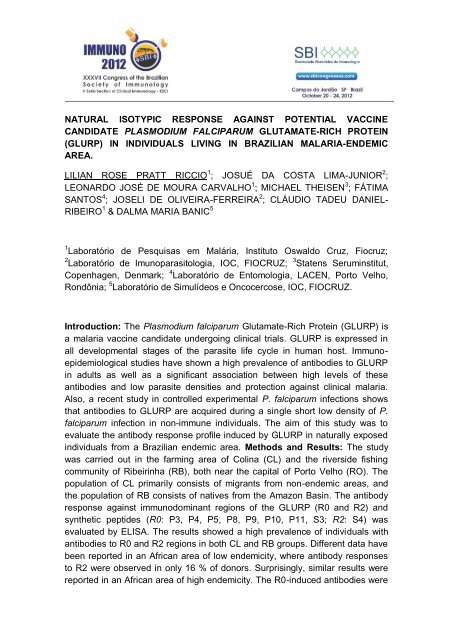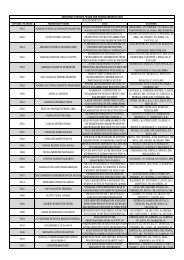immunology of infectious and parasitic diseases - XXXVII Congress ...
immunology of infectious and parasitic diseases - XXXVII Congress ...
immunology of infectious and parasitic diseases - XXXVII Congress ...
Create successful ePaper yourself
Turn your PDF publications into a flip-book with our unique Google optimized e-Paper software.
NATURAL ISOTYPIC RESPONSE AGAINST POTENTIAL VACCINE<br />
CANDIDATE PLASMODIUM FALCIPARUM GLUTAMATE-RICH PROTEIN<br />
(GLURP) IN INDIVIDUALS LIVING IN BRAZILIAN MALARIA-ENDEMIC<br />
AREA.<br />
LILIAN ROSE PRATT RICCIO 1 ; JOSUÉ DA COSTA LIMA-JUNIOR 2 ;<br />
LEONARDO JOSÉ DE MOURA CARVALHO 1 ; MICHAEL THEISEN 3 ; FÁTIMA<br />
SANTOS 4 ; JOSELI DE OLIVEIRA-FERREIRA 2 ; CLÁUDIO TADEU DANIEL-<br />
RIBEIRO 1 & DALMA MARIA BANIC 5<br />
1 Laboratório de Pesquisas em Malária, Instituto Oswaldo Cruz, Fiocruz;<br />
2 Laboratório de Imunoparasitologia, IOC, FIOCRUZ; 3 Statens Seruminstitut,<br />
Copenhagen, Denmark; 4 Laboratório de Entomologia, LACEN, Porto Velho,<br />
Rondônia; 5 Laboratório de Simulídeos e Oncocercose, IOC, FIOCRUZ.<br />
Introduction: The Plasmodium falciparum Glutamate-Rich Protein (GLURP) is<br />
a malaria vaccine c<strong>and</strong>idate undergoing clinical trials. GLURP is expressed in<br />
all developmental stages <strong>of</strong> the parasite life cycle in human host. Immunoepidemiological<br />
studies have shown a high prevalence <strong>of</strong> antibodies to GLURP<br />
in adults as well as a significant association between high levels <strong>of</strong> these<br />
antibodies <strong>and</strong> low parasite densities <strong>and</strong> protection against clinical malaria.<br />
Also, a recent study in controlled experimental P. falciparum infections shows<br />
that antibodies to GLURP are acquired during a single short low density <strong>of</strong> P.<br />
falciparum infection in non-immune individuals. The aim <strong>of</strong> this study was to<br />
evaluate the antibody response pr<strong>of</strong>ile induced by GLURP in naturally exposed<br />
individuals from a Brazilian endemic area. Methods <strong>and</strong> Results: The study<br />
was carried out in the farming area <strong>of</strong> Colina (CL) <strong>and</strong> the riverside fishing<br />
community <strong>of</strong> Ribeirinha (RB), both near the capital <strong>of</strong> Porto Velho (RO). The<br />
population <strong>of</strong> CL primarily consists <strong>of</strong> migrants from non-endemic areas, <strong>and</strong><br />
the population <strong>of</strong> RB consists <strong>of</strong> natives from the Amazon Basin. The antibody<br />
response against immunodominant regions <strong>of</strong> the GLURP (R0 <strong>and</strong> R2) <strong>and</strong><br />
synthetic peptides (R0: P3, P4, P5, P8, P9, P10, P11, S3; R2: S4) was<br />
evaluated by ELISA. The results showed a high prevalence <strong>of</strong> individuals with<br />
antibodies to R0 <strong>and</strong> R2 regions in both CL <strong>and</strong> RB groups. Different data have<br />
been reported in an African area <strong>of</strong> low endemicity, where antibody responses<br />
to R2 were observed in only 16 % <strong>of</strong> donors. Surprisingly, similar results were<br />
reported in an African area <strong>of</strong> high endemicity. The R0-induced antibodies were



